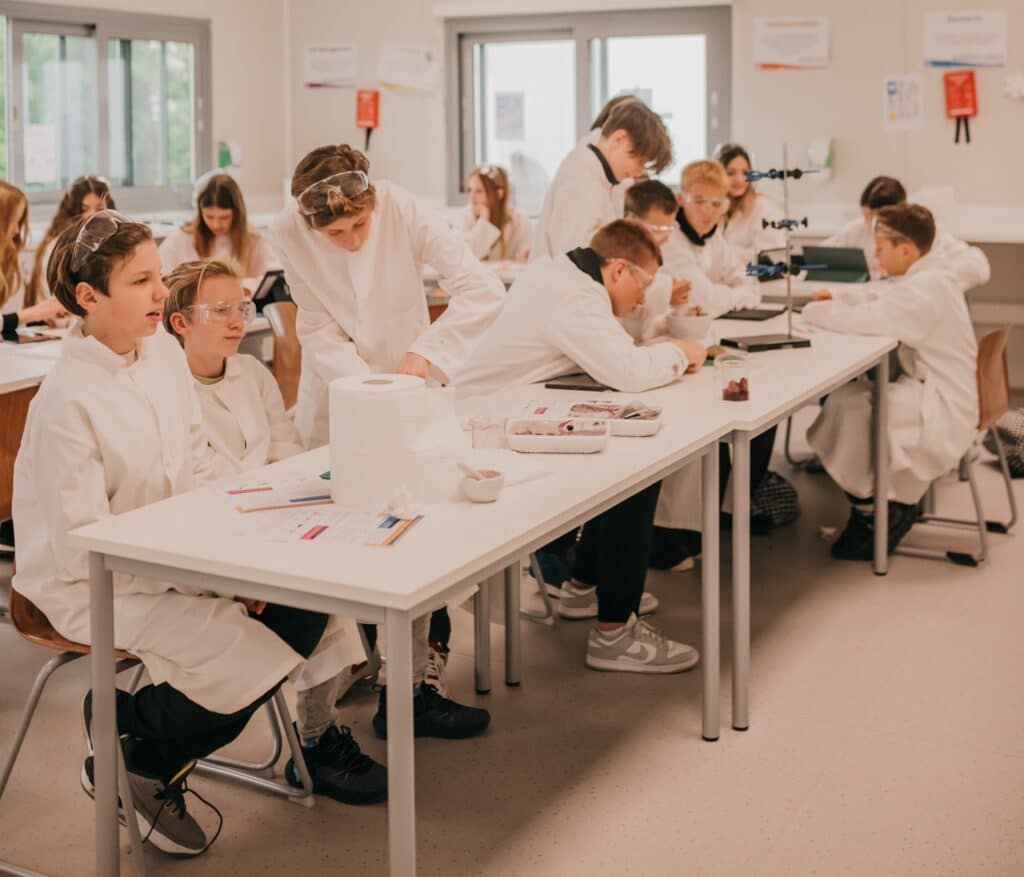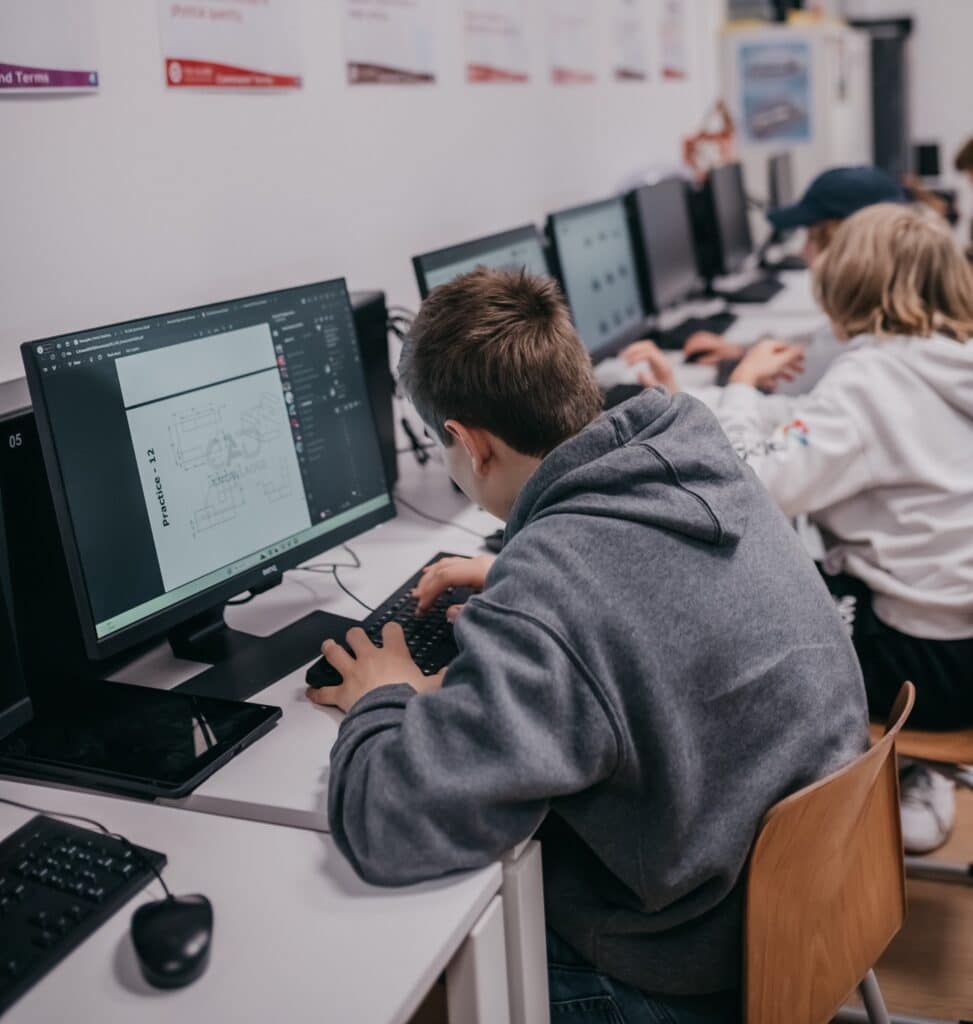The Island Private School in Cyprus is a progressive educational school offering a holistic learning environment for students of diverse cultural backgrounds.
“Looking forward, we plan to celebrate various faiths and cultures weekly next year and introduce composting bins to reduce landfill waste, supporting our gardening projects.”
The Island Private School integrates best practices from the International Baccalaureate, Waldorf, and Montessori educational systems. Focused on both academic excellence and developing 21st-century skills such as creativity, critical thinking, and collaboration, the school prepares students for top universities and global careers. The new campus, opened in 2022, features extensive facilities aimed at fostering a vibrant educational community.
Can you describe the mission and values that guide The Island Private School, particularly concerning ESG principles?
Our mission is to inspire a lifelong passion for learning across our community, nurturing the unique talents of each individual to prepare them as confident, responsible global citizens who value diversity. As The Island School, we’re a pioneering educational community of over 3,000 members, including families, students and team members, linked to extensive local and global networks, committed to progressive education.
We offer three educational tracks grounded in Environmental, Social, and Governance (ESG) principles, aiming for a sustainable and equitable future.
The International Baccalaureate (IB) track promotes global citizenship, environmental stewardship, cultural understanding, and ethical leadership. The Montessori track emphasises individualised learning, social responsibility, and self-discipline, fostering governance skills from a young age. The Waldorf track focuses on holistic development, creative expression, and social harmony, encouraging community involvement and sustainable practices. Both Montessori and Waldorf tracks stress environmental awareness, aligning with our holistic educational approach.

At The Island Private School, we integrate lessons on environmental sustainability, climate change, and conservation into various subjects, with input from both our faculty and external experts. Our dedication to environmental education is enhanced by outdoor activities and trips, allowing students to experience nature firsthand and participate in stewardship activities like beach clean-ups and tree planting. Our campus also boasts a biodynamic garden and olive grove, promoting sustainable agriculture practices.
In the arts, we encourage eco-friendly projects to raise environmental awareness among our students, reinforcing our commitment to the planet.
Socially, our diverse community of teachers and students from over 30 countries fosters a culture of diversity, equity, and inclusion. Through multicultural and anti-bias education, we celebrate our varied cultural backgrounds, ensuring everyone feels valued.
Our governance education emphasises practical learning, with guest speakers and real-world examples, preparing students for informed and responsible citizenship by understanding governance frameworks and their real-world applications.
What specific environmental programmes or initiatives has the school undertaken in the past to promote sustainability among its students and staff?
Our school is deeply committed to environmental sustainability, demonstrated through initiatives like recycling stations for various materials, and a strong push for digital communication to minimise paper usage. We’ve embraced emailing and online platforms for most school communications and assignments, significantly reducing photocopying.
Our Middle Years Programme (MYP) students actively contribute to the community, such as by cleaning local sports grounds and working on projects to reduce food waste in our canteen. We’ve also introduced a reusable utensils programme to cut down on single-use plastics.
To further our commitment, we’ve installed water refill stations to discourage the use of disposable plastic bottles and promote the use of reusable ones. Energy conservation is another key focus, with practices like turning off lights and unplugging devices when not in use being part of our daily routine.
In terms of social responsibility, how does The Island Private School engage with the local community and foster a culture of inclusivity and diversity?
The Island Charitable Foundation is committed to breaking down financial barriers to education for children in Cyprus, especially those from rural areas. Supporting over 20 children, our nonprofit initiative engages with communities in villages like Apesia, Palodia, and Alassa through sports tournaments, archery masterclasses, and dance events. These activities promote a healthy lifestyle and strengthen community ties.
We prioritise open communication and collaboration, hosting events that integrate local villages and encourage our students to participate in community service and social justice projects. This includes support for a dog shelter and cleanup activities.
Our school celebrates cultural diversity and inclusivity through events like International Yoga Day, Tsiknopempti, and cultural events from around the world, like the Lunar New Year, Hanukkah, and Maslenitsa. These celebrations not only highlight our school’s cultural diversity but also promote inclusivity, understanding, and respect across our community.

Can you give examples of how governance and ethical leadership are emphasised within the school’s administration and teaching practices?
Our school prioritises collaborative decision-making and stakeholder engagement in shaping policies and initiatives, ensuring diverse input for our future direction. In designing our new campus with a top international architecture firm, we maintain open communication across departments and educational programmes, leveraging a wide range of expertise for better transparency and feedback.
We also foster innovation through workshops and design thinking sessions, involving teachers, students, parents, and the community in creating our new educational hub. Committed to equality, we adhere strictly to Employment Law and anti-discrimination practices in staff appointments.
We emphasise well-being for students and educators, introducing programmes on positive psychology and activities like yoga and sports to enhance school life. Deborah Economou, our head of school, highlighted the significance of positive psychology in enhancing human functioning at the Reflect Festival, underscoring the importance of well-being for optimal functioning. We’ve also created a ‘Well-Being’ room for teachers to unwind.
We aim to grow our team of experienced and qualified educators, aligning their skills with our values and objectives. We promote a holistic educational experience and well-being through staff support and extracurricular clubs, including Dance, Music, Drama, and Sports, enriching our school community.
Reflecting on the past years, what have been the school’s most significant achievements in advancing ESG goals?
In just 85 days, we launched our current campus, embodying a young, inspired, confident, and proactive community committed to positively influencing the world. Since our grand opening on November 18, 2022, we’ve grown to accommodate over 750 students, continuously driven by innovative ideas and a global impact vision. Our unique educational hub thrives on the collaboration between families, local communities, and international education experts, collectively making The Island an exceptional place for everyone.
We proudly offer three educational programmes under one roof, championing diversity and inclusion. These principles are crucial for fostering sustainable and ethical business practices, enabling a comprehensive educational approach that meets a broad spectrum of student needs and backgrounds. This approach enhances community and understanding among diverse groups, and promotes social cohesion, and equality, leading to a more sustainable and responsible society.
Our team is truly international, with members hailing from over 30 countries, a testament to our commitment to global perspectives and inclusivity.

Our upcoming Final Year Art Exhibition at Gallery Morfi on April 19 will showcase art themed around happiness, featuring sustainable practices like natural pigments. This event, prepared by MYP students with teacher and younger student collaboration, supports the Hope for Children organisation, promoting community engagement and social responsibility.
Looking forward, we plan to celebrate various faiths and cultures weekly next year and introduce composting bins to reduce landfill waste, supporting our gardening projects. Our future campus will focus on ESG principles to minimise our carbon footprint, enhance energy efficiency, and use eco-friendly materials, aiming for a balance of academic excellence, sustainability, and social well-being.
What roles do students and parents play in shaping the school’s ESG strategies and activities?
We promote open dialogue and active participation through events like Morning Coffee Sessions with the Head, parent-teacher meetings, and showcasing IB Unit of Inquiry projects. Additionally, the Parents Club, founded by dedicated parents, hosts events to strengthen community ties, support learning, and entertain, aligning with the school’s goals.
What partnerships or collaborations has the school established to enhance its impact on environmental, social, and governance issues?
Island Private School’s teachers have been honoured with the prestigious Edu Gems programme, aligning them with an elite global network of over 300 educators recognised for their commitment to sustainability education, in line with the Unesco Roadmap. This accolade highlights a significant Cyprus-Finland collaboration in advancing global sustainability education.
Additionally, the school hosted a dynamic event focused on ecology for middle school students, in collaboration with various entities such as City Friends Club, ArtNation, Precious Plastic, and artnation.cy, alongside Timi Lee Willis and numerous others.
The event featured workshops and lectures on recycling, repurposing waste, and greenery preservation, alongside interactive activities like creating musical instruments from waste and designing comics with environmental solutions. Keynote speaker Timi Lee Willis emphasised the importance of individual efforts in environmental conservation.
The Green Energy Group educated students on green energy, discussing the impact of renewable versus non-renewable energy sources. At the primary level, a session by Supernovas emphasised community roles and empathy, linking learning to real-life scenarios.
Highlighting the school’s dedication to environmental stewardship, 6th-grade students planted 44 trees on November 24, 2023, in a collaborative effort with local and national organisations, demonstrating the school’s ongoing commitment to sustainability and community involvement.
How does the school measure and report on its progress towards ESG-related goals?
The Island Private School is in the process of preparing an Annual Report. To track our ESG performance, we employ a range of methods, including key performance indicators (KPIs), data collection on energy consumption and waste management, and stakeholder surveys. These metrics help us assess our environmental impact, social initiatives, and governance practices accurately.
We aim to ensure transparency and accountability by sharing both successes and challenges in achieving our sustainability targets. We engage with stakeholders through feedback sessions, and workshops to gather insights, address concerns, and foster a collaborative approach to advancing our ESG agenda.
Can you discuss any challenges the school has faced in integrating ESG principles and how you have overcome them?
Successful implementation of eco-friendly practices for our new campus, accommodating over 2,000 students, requires significant financial investment. To overcome this challenge, we have consulted with a diverse range of sustainability experts, including environmental engineers, energy consultants, and other specialists, to benefit from their expertise and ensure that our initiatives are both effective and cost-efficient. By leveraging their knowledge and experience, we have been able to identify innovative solutions, optimise our resource allocation, and develop a comprehensive strategic plan.
We are actively negotiating funding opportunities through grants and partnerships with like-minded and eco-conscious companies. With these strategic alliances in place, we are in a strong position to successfully execute our ambitious project.
What steps is the school taking to ensure that its facilities and operations are environmentally sustainable?
Our temporary school currently manages a Sewage Treatment Plant (STP), producing technical water – up to 30 tons daily – which is then utilised in the campus’s irrigation system for watering plants and vegetation. Additionally, the operation of all outdoor lighting on campus is efficiently managed through a programmable controller. This system adjusts for seasonal sunset variations and the shift between winter and summer times, thereby optimising electricity consumption.
How does the school encourage, and support student-led initiatives related to ESG?
The Student Council actively fosters student involvement in school governance, democratic practices, and social discourse. A highlight initiative was a competition to amass a substantial donation of pet food and supplies for Sirius Dog Sanctuary, where each class showcased unity and compassion through collective effort.
The IB programme aims to sharpen students’ critical thinking, enabling them to dissect complex issues, cultivate reasoned viewpoints, and make educated decisions on governance, ethics, and policy. We bolster our students by supplying resources, mentorship, and platforms for idea development and execution, including facilitating connections with experts and organisations and amplifying their projects within and outside the school community.

Our partnership with ASBIS Group, a premier IT and IoT solutions provider in Europe, the Middle East, and Africa (EMEA), offers our students a unique opportunity to interact with state-of-the-art technologies and brainstorm solutions to global issues.
Through firsthand experience in research labs and exposure to advanced computer technologies, students not only acquire practical skills but also cultivate a profound appreciation for innovation’s societal implications. This collaboration nurtures a sense of responsibility in our students, instilling a vision for a more sustainable and technologically advanced future.
How does the school’s approach to ESG differentiate it from other educational institutions?
Since all three educational programmes we offer are focused on the importance of the holistic development of children, we need to demonstrate a holistic and systemic approach to everything we do. Thus, the school’s ESG initiatives are not just standalone programmes but are deeply integrated into its organisational culture, decision-making processes, curriculum, and daily school life and operations. ESG are central consideration in the school’s strategic planning and resource allocation.
In 2023, The Island Private School was honoured with the prestigious TechIsland Award in the “Future Shapers” category. This recognition highlights the school’s commitment to pushing educational boundaries and integrating technology and innovative pedagogical practices. The award solidifies The Island Private School’s position as a leader in shaping the future of education in Cyprus.
Lastly, how does The Island Private School envision its role in the broader ESG landscape within the education sector in the next five to ten years?
By implementing forward-thinking strategies and fostering a strong sense of responsibility, the school aims to create a generation of students empowered to make a positive difference in the world. Here are some key highlights of the school’s envisioned role in the ESG landscape within and beyond the education sector:
International Education Hub: Supporting Cyprus in becoming one of the most attractive international education hubs in the world, positioning the school as a leader in global education excellence.
Diverse Educational Tracks: Keep offering different educational tracks to accommodate individuals from diverse cultural backgrounds, promoting inclusivity and embracing multiculturalism.
Multinational Community: Expanding as a multicultural community to foster a spirit of unity and understanding among students and staff, celebrating diversity and promoting cultural exchange.
Supporting Local Community: Promoting local community outreach programmes, fostering a sense of belonging and acceptance among all members of the school community.
Ethical Governance: Incorporating ethical governance practices in school decision-making processes, ensuring transparency, integrity, and accountability in leadership and management.
Environmental Partnerships: Strengthening partnerships with local environmental organisations for community projects and initiatives, demonstrating a commitment to environmental stewardship and sustainability.
Rural Development Initiatives: Contributing to the development of rural areas in Cyprus, investing in and supporting sustainable development outside urban centres.
Green Campus Development: Building a new campus implementing green technologies to reduce the school’s environmental impact, demonstrating leadership in sustainable infrastructure and operations.
Energy Efficiency and Renewable Energy: Promoting energy efficiency and renewable energy sources within school operations, reducing carbon footprint, and setting an example for sustainable energy practices.







Click here to change your cookie preferences